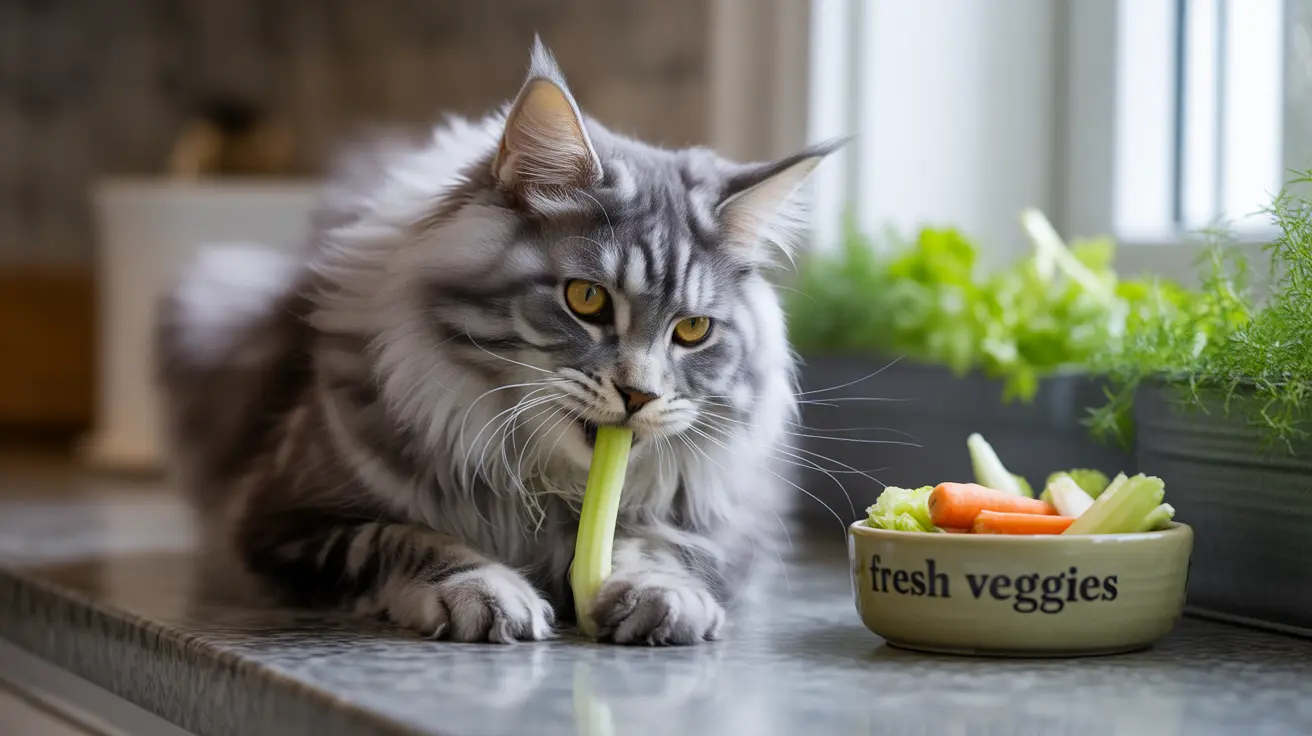If you're wondering whether cats can eat celery, the answer is yes - but there are important guidelines to follow. As obligate carnivores, cats primarily need meat-based nutrition, but celery can be a safe and healthy occasional treat when properly prepared and served in moderation.
In this comprehensive guide, we'll explore everything you need to know about feeding celery to your feline friend, including safety considerations, potential benefits, and proper serving methods.
Is Celery Safe for Cats?
Celery is non-toxic to cats and generally safe when offered in small amounts. The vegetable contains beneficial nutrients and is mostly water, making it a low-calorie treat option. However, it's crucial to understand that while safe, celery should never replace your cat's regular meat-based diet.
Even though celery is safe, some cats may experience sensitivity or allergic reactions, particularly those with existing allergies to environmental elements like mugwort or grasses. Always monitor your cat when introducing any new food into their diet.
Health Benefits of Celery for Cats
While cats don't require vegetables in their diet, celery can offer several potential benefits when served as an occasional treat:
Hydration Support
Celery is approximately 95% water, making it an excellent source of hydration, especially for cats who may not drink enough water regularly.
Dietary Fiber
The fiber content in celery can support healthy digestion and help prevent constipation in cats, though too much can cause digestive upset.
Nutritional Value
Celery contains various vitamins and minerals, including:
- Vitamin A for vision and immune health
- Vitamin K for proper blood clotting
- Potassium for muscle function
- Antioxidants for cellular health
How to Serve Celery to Your Cat
Proper preparation is essential when offering celery to your cat:
Preparation Steps:
- Wash the celery thoroughly to remove pesticides and dirt
- Cut into very small, manageable pieces to prevent choking
- Remove any stringy parts that could be difficult to digest
- Serve plain - avoid seasonings, dips, or additives
- Start with a tiny amount to test tolerance
Potential Risks and Precautions
While celery is generally safe, there are some important considerations:
Watch for These Warning Signs:
- Digestive upset (vomiting or diarrhea)
- Allergic reactions
- Difficulty chewing or swallowing
- Loss of appetite or disinterest in regular food
Cats with certain health conditions, particularly kidney disease, should only consume celery under veterinary supervision due to its natural diuretic properties.
Frequently Asked Questions
Can cats eat celery, and is it safe for them as a snack?
Yes, cats can safely eat celery as an occasional snack. It's non-toxic and can be beneficial when served in small, properly prepared portions.
How often can I give celery to my cat without causing digestive issues?
Celery should be limited to small amounts once or twice a week. It should not exceed 10% of your cat's daily food intake to prevent digestive problems.
What are the health benefits of feeding celery to cats, and how does it support their diet?
Celery provides hydration, fiber, and various nutrients including vitamins A and K, potassium, and antioxidants. However, it should only supplement, not replace, a balanced meat-based diet.
How should I prepare and serve celery to ensure it's safe for my cat to eat?
Wash the celery thoroughly, cut it into small, bite-sized pieces, remove stringy parts, and serve plain without any seasonings or additives.
Can cats that are allergic to environmental allergens safely consume celery, or are there cross-reactivity risks?
Cats with environmental allergies may be sensitive to celery due to cross-reactivity. If your cat has known allergies, consult with your veterinarian before introducing celery to their diet.
Conclusion
While celery can be a safe and healthy treat for cats, it's essential to remember that it should only be an occasional addition to their primary meat-based diet. Always introduce new foods gradually, prepare them properly, and monitor your cat for any adverse reactions. When in doubt, consult with your veterinarian about incorporating celery into your cat's diet.






